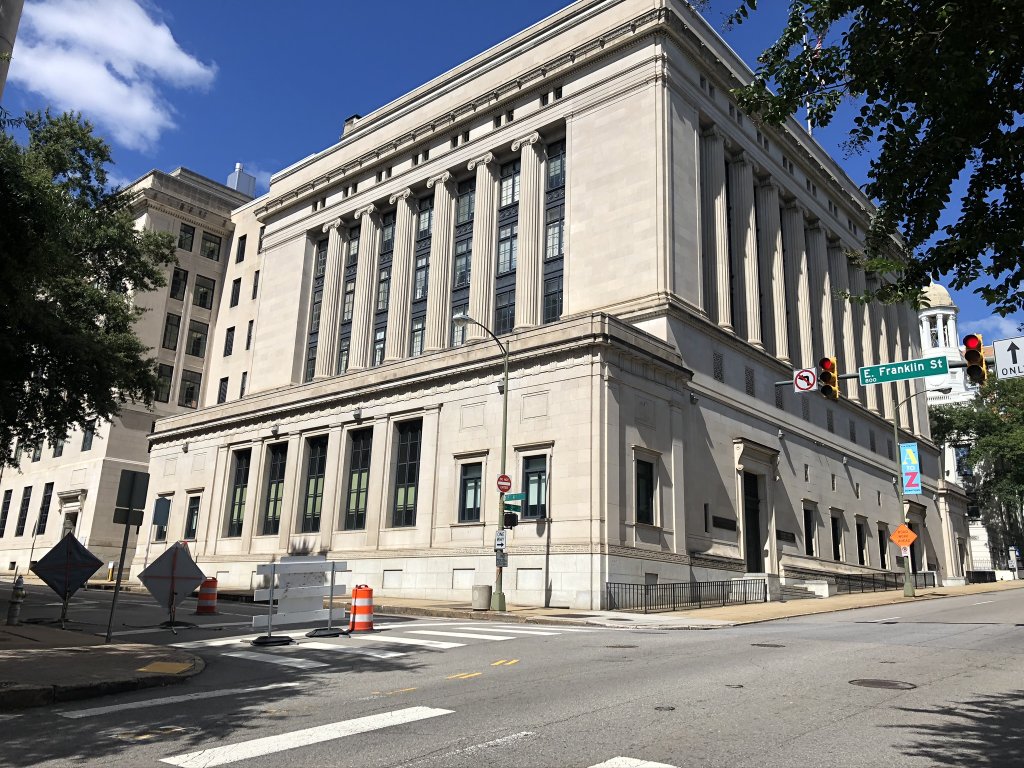
The Supreme Court of Virginia building in Downtown Richmond. (Robert Zullo/ Virginia Mercury)
The Virginia Supreme Court will take its time to decide a case that could keep Gov. Glenn Youngkin’s appointments from serving on three Virginia university governing boards, or allow them to serve after being sidelined since June. The high court heard oral arguments in the case on Thursday.
In August, Virginia Attorney General Jason Miyares, who is seeking reelection, appealed to the court after the Fairfax County Circuit Court suspended eight of the governor’s appointments from serving on the governing boards at the Virginia Military Institute, George Mason University and the University of Virginia.
Judge temporarily suspends appointees senators rejected from serving on Va. college governing boards
The lower court ruled in favor of nine Democratic state senators, some of whom serve on the Senate Privileges and Elections Committee, who requested the temporary injunction and said the committee’s decision to block the board nominees was a “definitive” refusal, according to court records. Democrats on the committee rejected the appointments due to concerns about their backgrounds, ideological leanings and qualifications while Republicans on the committee supported the appointees.
The justices spent roughly 30 minutes with the parties asking about the legislative procedures, constitutional interpretation and limits of judicial intervention in legislative matters involving the case. The court must now decide whether the Democrats’ challenge is valid and whether they have the right to bring it forward.
“I didn’t think that the justices, by their questions, were shedding a lot of light on where they might be going,” said Carl Tobias, a professor and expert in constitutional law at the University of Richmond. “I don’t know how this is going to go, or the timing.”
Tobias said both parties’ oral arguments were consistent with their stated briefs throughout the ongoing ordeal that has stretched through the summer. The central question of the case is whether a vote by the 15-member state Senate Privileges and Elections Committee constituted a “refusal to confirm” or “no” by the General Assembly under the Virginia Constitution’s Refusal Clause.
In Virginia, when the governor nominates a candidate to a board or commission to a seat, they need the General Assembly’s approval. Common practice by the General Assembly is to vote on the list of gubernatorial candidates in both chambers during the legislative session. In this situation, the lawmakers rejected the appointees outside of the regular session, a move they said would protect Virginia’s institutions of higher learning from partisan attacks, including those launched after President Donald Trump’s administration initiated several investigations into Virginia’s universities, primarily the University of Virginia and George Mason University.
The governor and Miyares said the action was outside the bounds of the law. A Fairfax County Circuit Court in June temporarily suspended the board appointees from serving as the matter plays out.
In court Thursday, Miyares’ office representing the three governing board rectors, argued that the circuit court’s decision was incorrect, asserting that the court lacked jurisdiction and that the committee’s vote did not meet the requirement for a final refusal because there were other ways for appointments to be confirmed. The attorney general is seeking to vacate the suspension.
Attorneys representing the lawmakers are hoping the court will uphold the lower court’s decision.
Tobias said the attorney general’s petition avoided the arguments Democrats are making about the committee’s longstanding practice and how state law supports them. Instead, it focuses on the fact that the Democratic Senators lacked standing to pursue the claims and should have used a different kind of writ.
Miayres’ office made a significant amount of “contingent arguments” to the court on Thursday, Tobias said, and “maybe (the justices will) be convinced by that, but maybe not.”
Tobias said that, on average, cases have taken between a month and three months to decide when there is disagreement among the justices.
The timing of the decision is also significant because in January, the next governor and new House members will join senators in considering future college board appointments.
Should the court overturn the suspension, the decision could create uncertainty about some appointments that were in line to fill the multiple vacancies at UVA, GMU and the Virginia Military Institute. In total, the Senate committee rejected 22 of the governor’s appointments.
“If it’s that strong a ruling in favor of the governor’s appointments, there may be an issue that arises there,” Tobias said. “So potentially, there could be more (appointments) than there are vacancies, and then I guess somebody is going to have to make a choice about who waits.”
NEWSLETTER SIGNUP
Subscribe to our newsletter! Get updates on all the latest news in Virginia.


![[Aggregator] Downloaded image for imported item #75661](https://allvirginia.news/wp-content/uploads/2025/11/image1-1-1024x768-1-696x522.jpeg)
